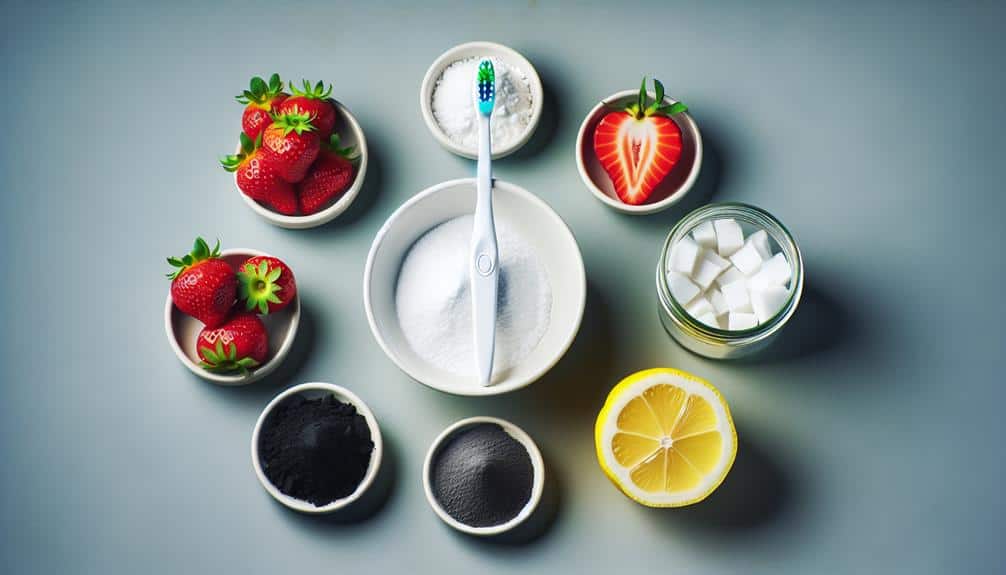If you have sensitive teeth, the best teeth whitening options for you include professional in-office treatments with personalized plans for quick and lasting effects. At-home whitening kits can also help, especially those with lower peroxide levels and desensitizing agents like potassium nitrate. Natural remedies like chamomile and clove can reduce sensitivity. Prioritize products gentle on enamel, use desensitizing toothpaste for and after whitening, and consult your dentist for tailored advice. Increasing your awareness of these options can help you achieve a brighter smile without compromising your dental health.
Key Points
- Use whitening products with lower peroxide levels to reduce sensitivity risk.
- Consider customized trays to minimize contact with sensitive gums during whitening.
- Opt for desensitizing agents like potassium nitrate for enamel protection.
- Prioritize gentle products that strengthen enamel with fluoride.
- Consult a dentist for guidance on the best whitening options for sensitive teeth.
Causes of Tooth Sensitivity
Tooth sensitivity is often triggered by exposed dentin, the inner layer of the tooth that contains nerves. Several factors can lead to this exposure, including enamel erosion caused by dietary factors and improper brushing techniques. Enamel erosion occurs when acidic foods or drinks wear down the protective outer layer of the tooth, exposing the more sensitive dentin underneath. It's essential to limit consumption of acidic foods and beverages to prevent this type of enamel damage.
Brushing techniques also play an important role in tooth sensitivity. Aggressive brushing or using a hard-bristled toothbrush can lead to gum recession, where the gum tissue pulls back from the tooth, exposing the roots and causing sensitivity. It's recommended to use a soft-bristled toothbrush and gentle, circular motions to clean the teeth effectively without causing damage to the enamel or gums.
Understanding these causes of tooth sensitivity can help you take preventive measures to protect your teeth and alleviate discomfort. By addressing dietary factors, practicing proper brushing techniques, and maintaining good oral hygiene, you can reduce the risk of tooth sensitivity and maintain a healthy smile.
Professional In-Office Treatments
Consider seeking professional in-office teeth whitening treatments for a more effective and immediate solution to brighten your smile. These treatments are administered under dental supervision, ensuring safety and top-notch results through the use of advanced technology. Here are four reasons why professional in-office treatments may be the best option for your sensitive teeth:
- Customized Care: Professional in-office treatments offer personalized treatment plans tailored to your specific needs and level of sensitivity, ensuring a comfortable experience.
- Quick Results: With professional in-office whitening, you can expect to see significant improvement in the color of your teeth after just one session, providing quick results that are perfect for those seeking immediate whitening effects.
- Expertise: Dental professionals who perform in-office whitening treatments have the expertise and experience to address any sensitivity issues that may arise during the procedure, ensuring a smooth and successful whitening process.
- Long-Term Benefits: In-office treatments not only whiten your teeth effectively but also provide long-lasting results, giving you a brighter smile that lasts.
At-Home Whitening Kits
When seeking teeth whitening options suitable for sensitive teeth, exploring at-home whitening kits can provide a convenient and cost-effective alternative. At-home whitening kits often come with customized trays to fit your teeth, aiding in sensitivity prevention by minimizing contact with gums.
These kits typically contain whitening gel with lower levels of peroxide, reducing the risk of sensitivity while still effectively combating teeth staining. The whitening effectiveness of these kits can be comparable to professional treatments, but it may take longer to achieve desired results. To safeguard enamel, select kits that include desensitizing agents like potassium nitrate or sodium fluoride.
Following the instructions carefully is crucial to prevent any damage to your teeth or gums. While at-home whitening kits can be a convenient option, consulting with a dentist before use is recommended, especially for individuals with sensitive teeth or existing dental conditions.
Natural Remedies for Sensitive Teeth
For individuals with sensitive teeth seeking gentle alternatives, exploring natural remedies can offer soothing relief and potential benefits. Here are some evidence-based natural remedies that may help alleviate tooth sensitivity and promote overall oral health:
- Herbal Remedies: Certain herbs like chamomile, aloe vera, and clove have anti-inflammatory and analgesic properties that can help reduce sensitivity and provide pain relief when applied topically or used in mouth rinses.
- DIY Solutions: Oil pulling with coconut oil, saltwater rinses, and applying a paste of baking soda and water can help maintain oral hygiene, reduce inflammation, and alleviate sensitivity. These DIY solutions are easy to incorporate into your daily routine.
- Preventative Care: Maintaining good oral hygiene practices, such as using a soft-bristled toothbrush, avoiding acidic foods, and using a desensitizing toothpaste containing potassium nitrate, can help prevent tooth sensitivity from worsening.
- Dietary Adjustments: Consuming a diet rich in calcium, vitamin D, and phosphorus can promote strong teeth and reduce sensitivity. Avoiding sugary and acidic foods can also help prevent enamel erosion, which can contribute to sensitivity.
Precautions for Sensitive Teeth Whitening
Exploring teeth whitening options for sensitive teeth requires careful consideration of precautions to guarantee minimal discomfort and best results. When dealing with sensitive teeth, protecting the enamel is vital during whitening procedures. Look for whitening products that are specifically designed to be gentle on enamel to prevent damage and sensitivity. These products often contain ingredients like potassium nitrate or fluoride that help strengthen and protect the enamel while whitening the teeth.
Additionally, sensitivity prevention is essential before and after teeth whitening treatments. Before starting any whitening regimen, it's recommended to use a desensitizing toothpaste for a couple of weeks. This helps build up protection against potential discomfort caused by the whitening agents. After the treatment, continue using the desensitizing toothpaste to maintain enamel strength and reduce sensitivity.
Frequently Asked Questions
Are There Any Specific Toothpaste Brands That Are Recommended for Sensitive Teeth When Undergoing Whitening Treatments?
When whitening teeth with sensitivity, opt for toothpaste designed for sensitive teeth to prevent discomfort. Look for brands like Sensodyne or Pronamel. These can help minimize side effects while still achieving effective whitening results.
Can Teeth Whitening Treatments Worsen Existing Dental Conditions Such as Cavities or Gum Disease in Individuals With Sensitive Teeth?
Teeth whitening treatments for sensitive teeth can worsen existing dental issues like cavities or gum disease. Prioritize oral hygiene to prevent problems. Consult your dentist for pain management options during dental procedures to guarantee dental health.
How Long Should Someone Wait After a Teeth Whitening Treatment Before Consuming Hot or Cold Foods and Beverages if They Have Sensitive Teeth?
After a teeth whitening treatment, manage sensitivity by waiting 48-72 hours before consuming hot or cold foods. This recovery time helps reduce temperature sensitivity post-treatment. Protect your sensitive teeth by allowing them time to recover.
Are There Any Special Considerations for Individuals With Sensitive Teeth Who Also Have Dental Restorations Such as Crowns or Veneers?
When dealing with dental restorations like crowns or veneers, it's important to guarantee restoration compatibility. Managing sensitivity in such cases requires specialized care to safeguard both your dental work and comfort.
Is It Safe to Use Teeth Whitening Strips or Gels if You Have Sensitive Teeth, and Are There Any Specific Products Recommended for Sensitive Individuals?
If you experience tooth sensitivity, managing it is key. Consider alternative options like gentle whitening toothpaste or professional treatments. Consult with your dentist for personalized recommendations tailored to your specific needs and concerns.



